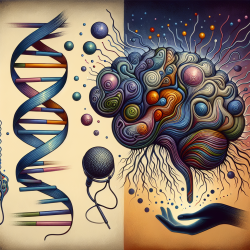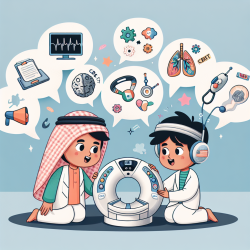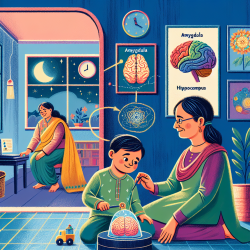Introduction
The field of genetics has continuously revealed insights into the underlying causes of various neurodevelopmental disorders. A recent study titled "A Novel De Novo Mutation of the DHX30 Gene in a Patient With Neurodevelopmental Disorder, Severe Motor Impairment, and Absent Language (NEDMIAL)" provides a new perspective on the role of the DHX30 gene in such disorders. This blog aims to highlight the key findings of the study and explore how practitioners can use this knowledge to improve therapeutic outcomes for children with similar conditions.
Understanding the DHX30 Gene and Its Implications
The DHX30 gene is part of the DExH-box helicases, a group of proteins that play a crucial role in unwinding RNA secondary structures. Mutations in this gene have been associated with a range of severe phenotypic abnormalities, including intellectual disability, motor developmental delay, and absent language. The study in question presents a novel mutation, p.Pro796Leu, in a 12-year-old female patient, suggesting an upgrade in the classification of this variant to "likely pathogenic."
Clinical Implications for Practitioners
For practitioners in speech-language pathology and related fields, understanding the genetic basis of disorders like NEDMIAL is essential for developing effective treatment plans. The study's findings underscore the importance of genetic testing in diagnosing complex neurodevelopmental disorders. By incorporating genetic insights into their practice, clinicians can tailor interventions more precisely to the individual needs of their patients.
Key Takeaways for Practice
- Genetic Testing: Encourage comprehensive genetic testing, such as whole exome sequencing, for patients with unexplained neurodevelopmental symptoms.
- Interdisciplinary Collaboration: Work closely with geneticists, neurologists, and other specialists to create a holistic treatment approach.
- Personalized Therapy: Use genetic findings to inform the development of personalized therapy plans that address specific deficits in motor and language skills.
- Continuous Education: Stay informed about the latest research in genetic mutations and their impact on neurodevelopmental disorders to enhance clinical practice.
Encouraging Further Research
The study highlights the need for further research into the DHX30 gene and its variants. Practitioners are encouraged to participate in or support research initiatives that aim to uncover more about the genetic underpinnings of neurodevelopmental disorders. Such efforts can lead to the development of new therapeutic strategies and improve outcomes for affected children.
To read the original research paper, please follow this link: A Novel De Novo Mutation of the DHX30 Gene in a Patient With Neurodevelopmental Disorder, Severe Motor Impairment, and Absent Language (NEDMIAL).










